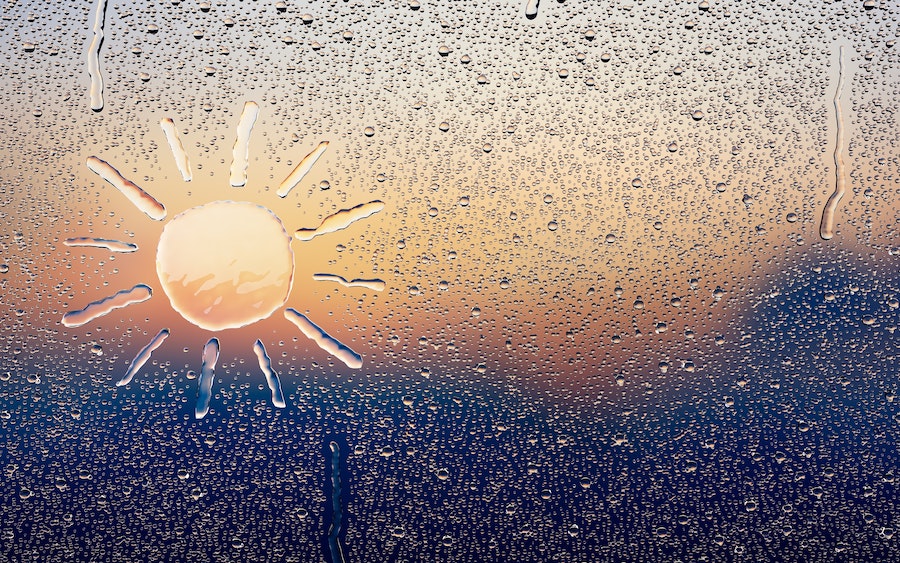6 ways to prevent condensation in your home
Condensation is something none of us want in our homes, as it’s the most common cause of damp problems.
It’s actually a very common issue, affecting one in five homes – and it can be found in properties of any age, size or design. It occurs when humid warm air comes into contact with a cold surface. Warm air can hold a lot more water vapour than cold air, so when it’s rapidly cooled by a cold surface, it can quickly form into the water droplets typical of condensation. Everyday activities, such as cooking, boiling the kettle, using hot water in the shower or bath, or drying clothes inside, can contribute to condensation forming inside a property.
Richard Walker, national technical and development manager at property preservation experts Peter Cox (petercox.com), explains: “Condensation is the visible consequence of the production of moisture within a building, and most commonly occurs between October and April. On average, a family of four produces 14 litres (24 pints) of water vapour each day, so keeping a house correctly heated and well ventilated is an important part of preventing condensation. If left unaddressed, mould and damp can also begin to form, which is not only unsightly, but may create health risks for the occupants.”
#DidYouKnow that #Condensation is actually the most common cause of damp problems in the UK? Given that we are now in condensation season it makes sense to be vigilant to make sure excessive condensation does not create a property problem for you. #ShareTheLuv #PeterCox pic.twitter.com/nfKRAZg929
— Peter Cox (@petercox1951) October 18, 2019
Here, Walker suggests six ways to help address a condensation issue, but points out that if it persists or deteriorates despite trying everything, homeowners should consider contacting an accredited surveyor to investigate the cause and suggest a solution.
1. Ventilate your house
Where possible, ventilate the house to let the build-up of water vapour escape, particularly if you’re drying clothing indoors. If you have double glazing, then keep the trickle vents open. When cooking or boiling a kettle in the kitchen, or using hot water in the bathroom, close the doors and put the extractor fan on to prevent the moisture from escaping to colder rooms and collecting on the walls.
2. Consistent central heating
When you turn the central heating on, heat the whole property on a low heat, rather than leaving some rooms cooler and susceptible to condensation. ‘Yo-yo’ heating doesn’t warm the fabric of the building and unnecessarily increases the risk of condensation forming.
3. Avoid dehumidifiers
Despite their popularity, dehumidifiers merely mask the condensation problem and don’t address the real cause. They can require frequent emptying and will stop once the collector unit is full. Moreover, they’re noisy and can be costly to buy and run.
4. Don’t let condensation settle
If you spot condensation forming in the home, it’s always advisable to wipe damp surfaces down, rather than letting it settle. Remember to wring the cloth out in a sink, rather than letting it dry in the room. When condensation is allowed to settle on a surface for more than six hours, it creates the conditions for mould to form, which in some cases, can damage surfaces by staining.
5. Regular maintenance and expert advice
Regular maintenance is key to preventing ongoing issues. Identify any problem areas as they occur and seek professional advice to address them immediately. Every case is different, and property care specialists are trained to evaluate the specific causes of condensation issues and advise homeowners on how to prevent any reoccurrence.
6. Consider installing a Positive Input Ventilation system
Positive Input Ventilation (PIV) units are sophisticated ventilation and condensation control units to aerate entire homes. Property surveyors may recommend the installation of a PIV system to help to ventilate a building, by diluting and displacing any damp air. From installation, the unit gently ventilates the home with fresh air, which is pushed back down into the house and redistributed. Such systems tend to cost around £250-£400.
The Press Association
Latest posts by The Press Association (see all)
- The best ways to boost your immune system as cold temperatures hit - January 5, 2025
- The Osmonds star and ‘beloved husband and father’ Wayne Osmond dies aged 73 - January 2, 2025
- What screenings are available on the NHS to detect cancer early? - January 2, 2025
- Help your grandchildren make the most of Big Schools’ Birdwatch - January 1, 2025
- Veteran radio star Johnnie Walker dies aged 79 - December 31, 2024




















